Knowledge, Attitude and Practice of Research among Undergraduate Medical Students in India
Maulin Dhiren Mehta1, Jayant Patharkar2, Ervilla Dass3
1 Associate Professor, Department of Pharmacology, Smt. B. K. Shah Medical Institute and Research Centre, Sumandeep Vidyapeeth Deemed to be University, Piparia, Vadodara, Gujarat, India.
2 Assistant Professor, Department of Pharmacology, Smt. B. K. Shah Medical Institute and Research Centre, Sumandeep Vidyapeeth Deemed to be University, Piparia, Vadodara, Gujarat, India.
3 Associate Professor, Department of Pharmacology, Smt. B. K. Shah Medical Institute and Research Centre, Sumandeep Vidyapeeth Deemed to be University, Piparia, Vadodara, Gujarat, India.
NAME, ADDRESS, E-MAIL ID OF THE CORRESPONDING AUTHOR: Dr. Maulin Dhiren Mehta, B/13, Shantivan Park Soc., B/H New District Court, OP Road, Vadodara-390007, Gujarat, India.
E-mail: mdmmehta@gmail.com
Introduction
“The detailed process of gathering information or detailed study to discover and understand new information that would initiate, modify or terminate present understanding” is the definition of research. Research is very important in every field to generate new information in particular subject.
Aim
To evaluate Knowledge, Attitude and Practice (KAP) of research in undergraduate medical students in a medical college, India.
Materials and Methods
It was a questionnaire based cross-sectional study. Total 150 students from first, second and third year MBBS from the medical college participated voluntarily. Percentages of students were taken for statistical analysis.
Results
Out of 150 students, total 143 (95.43%) students had basic understanding about research. Total 139 (92.7%) students knew about both the research study designs that is observational and experimental. Only 59 (41.3%) students knew that randomised controlled trial is not an observational study. Only 62 (42.8%) students knew that meta-analysis type of studies can generate highest level of evidence. Total 88 (58.66%) students were willing to conduct the research. Lack of time (88 students, 60.7%) and lack of guidance (86 students, 59.3%) were two major hurdles for conducting research study. Total 8 (5.3%) students were currently conducting research out of 150.
Conclusion
As per the study, in-depth knowledge required to conduct research is not upto the mark among undergraduate medical students. They are willing to conduct research but their major limitations are time and guidance during undergraduate tenure. By including research methodology as subject in undergraduate medical curriculum, medical students can be inspired to conduct research efficiently. Those who are practicing research are getting favourable outcome from it.
Board of governance, Curriculum, Limitations, Questionnaire, Randomisation
Introduction
“The detailed process of gathering information or detailed study to discover and understand new information that would initiate, modify or terminate present understanding” is the definition of research [1]. Research is very important in every field to generate new information in particular subject. Similarly, continuous medical research is required to update medical information, related with basic sciences, diseases, new drug molecules, management of disease, etc.
Research generated information will be useful for generating evidence based medicine [2]. It requires both skills and knowledge in subject, for doing research efficiently. Most of the healthcare professionals are involved in research activities including undergraduate students worldwide. In developed countries, medical undergraduate students are given ample inspirations and incentives to propagate research [1]. There are various research programs run worldwide, like Medical Student Research Program in Diabetes under Johns Hopkins University Schools of Medicine for undergraduates [3] and Indian Council of Medical Research- Short Term Studentship (ICMR-STS). India is also one of the example of program providing fund to undergraduate medical students for motivating and conducting research activity [4]. Quality work in research helps students in improving their curriculum vitae and better chance of developing bright career. So, medical research work is useful both at personal level and in betterment of health of society.
In developing countries, like India, lack of quality research work is seen in undergraduate students due to various issues like, lack of adequate knowledge about research methodology, no inspiration from faculties, inadequate timings due to broad subjects, etc., [5]. So, the current study was planned to evaluate KAP of research among undergraduate medical students in India.
Materials and Methods
It was a questionnaire based cross-sectional study. Total 150 students participated voluntarily from first, second and third year MBBS from a medical college. Random voluntary sampling was done and informed consent was obtained from the students. Ethics Committee Approval was not required as the study was conducted on students without using any medical ailments. Students filled the pre-validated questionnaire in a google form in one day in the month of July’2020. They were allowed to choose an option to each question, whatever they feel appropriate. They could have opted out more than one option, wherever applicable. The collected data was entered into excel sheet and analysed further. The questionnaire has been provided in [Annexure-1] [5].
Statistical Analysis
The collected data was entered into excel sheet for analysis and percentages were calculated.
Results
Total 150 students participated in the study from first, second and third year MBBS. All the students did not attended all the questions.
a) Knowledge:Out of 150 students, total 143 (95.43%) students had clear idea related to research in their mind as mentioned in [Table/Fig-1] (All responded).
In question related to type of research study design, total 139 (92.7%) students knew about both the research study designs that are observational and experimental [Table/Fig-2] (All responded).
Out of all the given types of research studies, total 59 (41.3%) students knew that randomised controlled trial is not an observational study (Total 143 responded).
In terms of evidence generation, total 62 (42.8%) students knew that meta-analysis type of studies can generate highest level of evidence (Total 145 responded).
About research methodology, total 118 (80.8%) students had clear idea about role of randomisation in research methodology [Table/Fig-3] (Total 146 responded).
Total 64 (45.7%) students knew that double blind will eliminate investigators’ influence in research (Total 140 responded).
In terms of knowledge about statistics, total 81 (57.4%) students know that standard deviation is measures of dispersion (Total 141 responded).
Total 147 (99.32%) students knew that both Kishore Vaigyanik Protsahan Yojna (KVPY) and ICMR are supporting and providing fund for research project to undergraduate medical students (Total 148 responded).
b) Attitude:Total 88 (58.66%) students were willing to conduct the research study during their undergraduate tenure [Table/Fig-4] (All responded).
To understand the subject thoroughly and to know the recent advances were the two major motivating factors to conduct research as mentioned by 112 (75.7%) and 105 (70.9%) students, respectively [Table/Fig-5] (Total 148 responded).
Lack of time (by 88 students, 60.7%) and lack of guidance (by 86 students, 59.3%) were two major hurdles felt by undergraduate students for conducting research study [Table/Fig-6] (Total 145 responded).
Research on conditions where cure is not available, like COVID-19 (by 50 students, 33.33%), cancer (by 24 students, 16%) and mental health (by 14 students, 9.33%) were selected as main topic of interest by students who wanted to conduct research.
Total 97 (71.9%) students have attended lectures, followed by workshop by 36 (26.7%), Continuing Medical Education (CME) by 28 (20.7%), conference by 27 (20%) and other by 14 (10.4%) related to research. (Students can select or give more than one reply. Therefore, one student can reply Lecture, CME, Conference and all as their answers. That is why data can be more than 100% in total).
Total 118 (81.4%) students agreed that one research project during undergraduate curriculum should be compulsory [Table/Fig-7] (Total 145 responded).
c) Practice:Total 8 (5.3%) undergraduate medical students, out of 150, were currently conducting research.
Among those who were conducting research (8 students), total 04 students (50%) felt that lack of time was the major limitation for conducting research during undergraduate tenure.
Total 6 (75%) students, out of 8 students, received extramural fund for conducting research.
Other benefits mentioned by students, who have conducted any research during undergraduate tenure, were better understanding of subject and improved knowledge.
Students’ knowledge about what is research.
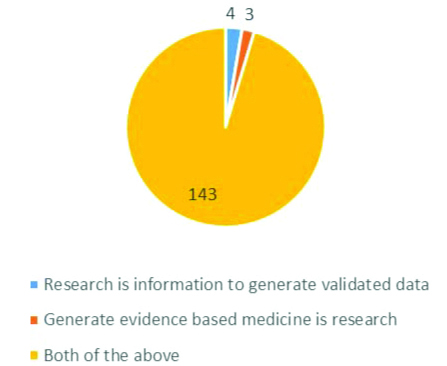
Students’ knowledge about basic types of research study design.
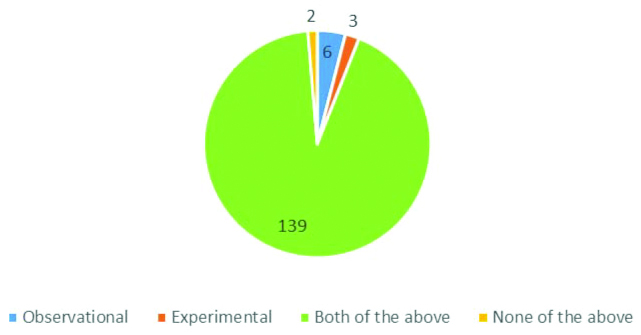
Students’ knowledge about role of randomisation in research methodology.
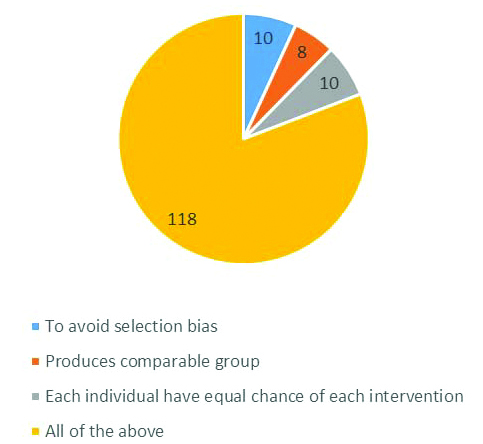
Undergraduate medical students willing to conduct research study.
| Question (Attitude) | Yes (%) Number of students | No (%) Number of students | May be (%) Number of student |
|---|
| Willing to conduct research during undergraduate tenure | 88 (58.66%) | 10 (6.67%) | 52 (34.67%) |
Motivation factors to conduct research study according to students.
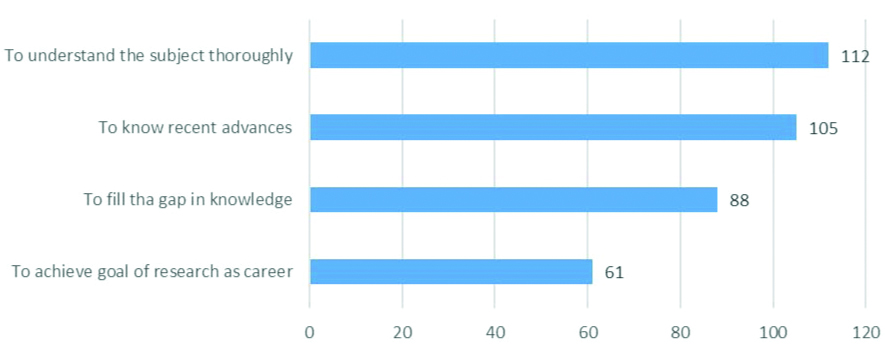
Hurdles to conduct research study according to students.
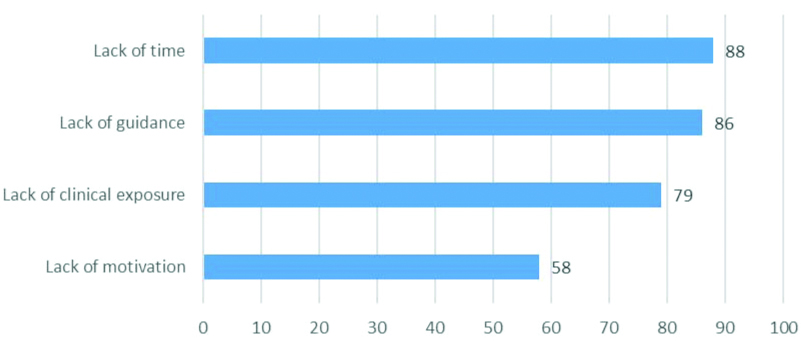
Students’ perception about one compulsory research project during undergraduate tenure.
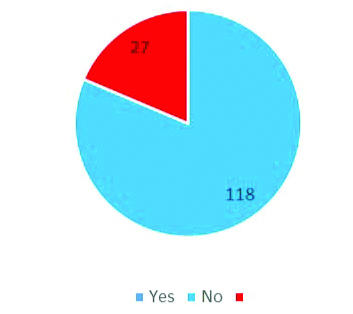
Discussion
Students’ knowledge of research:
According to the obtained results, majority of the students had clear idea that research is conducted to generate information for validated data and evidence for medicine and most of them knew the types of research study that is observational and experimental. These are some basic knowledge about research and majority of the students in the study knew about it. On asking about various examples of observational research study, only few students knew that randomised control trial is not an observational research study. Only few students knew that meta-analysis generates the highest level of evidence for research. These outcomes showed that students did not have the in-depth knowledge about research study design and its importance. Similarly, only few students knew the advantages of doing double blinding in research. Present study findings related to less knowledge about research study design, blinding and its importance are similar to the study conducted by Goli S et al., [5]. Majority of the students knew about KVPY and ICMR funded research project for undergraduate medical students in India. Overall, it can be said from the present study that students in various semester of MBBS have basic idea about research while detailed lectures of research methodology are required to generate knowledge about research study design, blinding and its importance, etc.
Students’ Attitude of Research:
In terms of students’ attitude towards research, it was found from the study results that only few students were willing to conduct research during undergraduate tenure. Proper training and guidance about research can convince rest for conducting research. Regarding motivating factors for conducting research, to understand the subject thoroughly (Knowledge gaps) and to know the recent advances are the major motivating factors, findings similar to other studies conducted previously [5,6]. While the lack of time and guidance was the major limiting factors for the research. Present study findings about limiting factors for research are similar to many other studies conducted previously [7,8]. Recently Board of Governance superseding Medical Council of India (MCI) further reduced the second year duration from 1.5 years to 1 year [9]. Lack of time and vast course of MBBS are really serious issues for conducting research during undergraduate medical tenure in India.
If students are allowed to conduct research, cure of diseases with no proper treatment, like COVID-19, cancers, etc., are their prime topics of interest. From the present study it was found that positive results was obtained in terms of treatment of such conditions if students were encouraged to conduct research studies. Majority of the students have attended lectures, workshops, conferences or CME related with research. They also believe that one project work should be made compulsory during entire undergraduate tenure. It is showing their positive attitude towards learning research skills.
Students’ Practice of Research:
Only minimal students were conducting research work currently. It could be due to less knowledge and awareness for conducting research among students. Early classes for teaching research methodology are required to make them aware for research, similar to finding in other study also [5]. Those who have conducted research, get extramural funding and extra knowledge of the subject. To improve students’ practice of research, early knowledge of research should be imparted.
Limitation(s)
Due to COVID-19 situation, whole study was conducted through google form link.
Conclusion(s)
As per the study, in-depth knowledge required to conduct research is not upto the mark among undergraduate medical students. They are willing to conduct research but their major limitations are time and guidance during undergraduate tenure. By including research methodology as a subject in undergraduate medical curriculum, we can inspire them to conduct research efficiently. Those who are practicing research are getting favourable outcome out of it.
Author Declaration:
Financial or Other Competing Interests: None
Was Ethics Committee Approval obtained for this study? No
Was informed consent obtained from the subjects involved in the study? Yes
For any images presented appropriate consent has been obtained from the subjects. NA
Plagiarism Checking Methods: [Jain H et al.]
Plagiarism X-checker: Oct 26, 2020
Manual Googling: Nov 17, 2020
iThenticate Software: Dec 14, 2020 (6%)
[1]. Jimmy R, Palatty PL, D’Silva P, Baliga MS, Singh A, Are medical students inclined to do research?J Clin and Diag Res 2013 7(12):289210.7860/JCDR/2013/6698.378624551667 [Google Scholar] [CrossRef] [PubMed]
[2]. Sharma N, Pramila M, Krishnamurthy A, Umashankar GK, Ranganath Ahuja N, Knowledge, attitude and practices in research among postgraduate students in dental Institutions in Bengaluru city, IndiaJ Indian Association of Public Health Dentistry 2014 12(3):189-94.10.4103/2319-5932.144793 [Google Scholar] [CrossRef]
[3]. Medical undergraduate research in world. https://www.hopkinsmedicine.org/som/students/research/. [Last accessed on 30/06/20] [Google Scholar]
[4]. ICMR- Short Term Studentship, http://14.139.60.56:84/Homepage.aspx. [Last accessed on 30/06/2020] [Google Scholar]
[5]. Goli S, Munge B, Vedula P, Knowledge, attitude and practice of research among second year undergraduate medical students in a medical college of Telangana, IndiaJ Clin and Diag Res 2020 14(3):6-8.10.7860/JCDR/2020/43349.13585 [Google Scholar] [CrossRef]
[6]. Habib SR, AlOtaibi SS, Abdullatif FA, AlAhmad IM, Knowledge and attitude of undergraduate dental students towards researchJournal of Ayub Medical College Abbottabad 2018 30(3):443-48. [Google Scholar]
[7]. Haripriya M, Santosh Kumar MP, Knowledge attitude and practice regarding research methodology among post graduate dental studentsInternat J Pharmaceutical Sci Rev and Res 2017 44(2):180-85. [Google Scholar]
[8]. Vairamani CR, Akoijam BS, Knowledge, attitude and perceived barriers towards conducting research among students in a medical college, IndiaInternatl J Community Med Public Health 2018 5(2):806-10.10.18203/2394-6040.ijcmph20180273 [Google Scholar] [CrossRef]
[9]. Medical Council of India. Competency Based Undergraduate Curriculum for the Indian Medical Graduate. 2018. [Last accessed on 06/07/2020]. Pp. 1-3. Available from: https://www.mciindia.org/CMS/information-desk/for-colleges/ug-curriculum [Google Scholar]